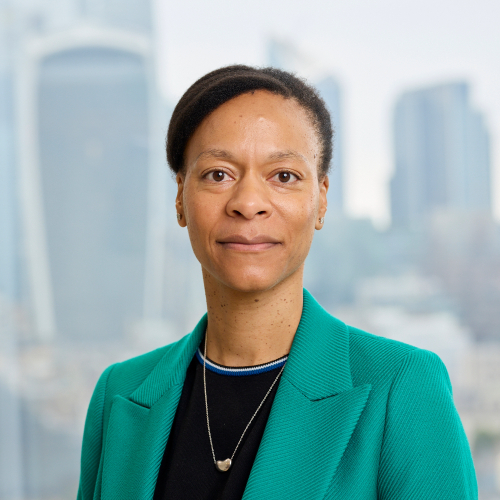Beneficiaries of the MBA Inspiring Females scholarship at Warwick Business School reveal how this support has been a gateway to transformative experiences.
Accelerate Action: International Women's Day advice from our MBAs
As part of our International Women’s Day celebrations, we caught up with Inspiring Women from across our MBA programmes, asking them to share their thoughts and ideas around 2025’s theme of ‘Accelerate Action’.
Read on to discover what accelerating action means to them, how they’re striving to achieve gender parity as individuals, what employers should be doing to accelerate action, and their guidance for young women in business.
What does ‘Accelerate Action’ mean to you?

Metta (Full-time MBA participant):
To me, this theme signifies stepping up and taking decisive measures to dismantle systemic barriers and biases. Achieving gender equality requires more than just listening and accepting—we must embed it as a priority in our daily decisions, workplace cultures, and leadership strategies.
Amber (Executive MBA participant):
International Women’s Day is a vital occasion for us to celebrate the achievements and contributions of women, while also acknowledging that gender parity has yet to be realised. Current statistics indicate that we are still over 130 years away from achieving true equality, which is simply unacceptable. Therefore, this theme is of utmost importance. I want my daughter to grow up in a world where her contributions are valued equally, and my hope for future generations is that discussions about gender equality will no longer be necessary.
Israil (Executive MBA (London) participant):
"Accelerate Action" is more than just a catchphrase. At a pivotal time when the concept of inclusion has become increasingly politicised, the call to accelerate action represents an urgent reminder that incremental change is not sufficient, but progress must encompass all women's experiences, across intersections of race, class, ability, and identity.
Nyema (Global Online MBA participant):
It’s a call to move beyond rhetoric and into actionable, measurable progress. The timeline highlighted by the World Economic Forum to achieve gender parity by 2158 is simply unacceptable. We must collectively and intentionally act now, putting resources into policy change, leadership development, and corporate social responsibility targeted at achieving gender equality. Rewrite policies, create opportunities, and challenge existing leadership structures to include more women. Evidently, systems must be designed to accelerate progress.
When have you taken action to drive change or overcome a challenge in your career or studies?

Israil:
Having the opportunity to lead diversity, equity, and inclusion teams globally has shown me what can be achieved with the right intention and focus. Launching initiatives including encouraging those with long-term career breaks to re-enter the workforce with dedicated support to retrain and upskill, providing greater focus on the wellbeing of those encountering significant life stages such as menopause and introducing increased support for working families. Notably, the changes I have introduced in the organisations have focused on more than policies – they have driven a fundamental shift in workplace culture and mindset. Moreover, they have benefited all employees demonstrating that by accelerating action, we improve society.
Nyema:
One impactful moment in my career was when I had the opportunity to advocate for a longer, more inclusive maternity leave policy within my organisation, as General Secretary of the staff representative body.
At the time, our maternity leave policy granted biological mothers 12 weeks of paid leave. However, there was no provision for adoptive mothers and mothers who took the route of surrogacy. Recognising this gap, I led an initiative from the position of staff representation to push for an expansion of the policy. Through dialogue and advocacy, we secured an increase in maternity leave from 12 to 14 weeks and, most importantly, ensured that this benefit was extended to adoptive mothers and mothers who opt for surrogacy as well.
This experience reinforced for me the importance of using my voice to challenge outdated norms and advocate for policy changes, creating lasting impact.
Amber:
I have had the privilege of collaborating with the Institution of Engineering and Technology (IET) to promote the inclusion of women in engineering, demonstrating that it is a viable career path for everyone. According to 2023 data, only 15.7% of the engineering workforce in the UK comprises women, a figure that has unfortunately declined in recent years. It is crucial for women to enter STEM fields, as diverse perspectives foster genuine innovation.
Additionally, I established a women’s network at Siemens Energy in the UK and Ireland, which has brought together hundreds of women, providing opportunities for networking, knowledge exchange, and access to tailored training. Within my own division at Siemens Energy, I also implemented Unconscious Bias training for all employees. Understanding the issues at hand is the first step towards addressing them, making this educational initiative incredibly important.
Metta:
Transitioning from the fashion industry to the sports sector, I encountered a prevalent bias—men were often favoured for leadership roles in global sports brands due to the assumption that they had a closer connection to sports. This perception ignored the significance of skills, competency, and contributions. Rather than feeling discouraged by these stereotypes, I chose to challenge the status quo. When a relationship manager role opened up, I stepped forward, refusing to let biases dictate my career trajectory.
That decision changed everything. Through perseverance, positivity, and strategic action, I secured exclusive partnerships and collaborations with global brands, achieving ground-breaking results. More importantly, my journey inspired my colleagues—showing them that taking bold steps and challenging stereotypes leads to progress. I saw talented women around me gain confidence, step into leadership roles, and advocate for inclusivity in their own careers.
How can the business world accelerate action towards achieving gender parity and inclusivity?

Amber:
Every business has the opportunity to drive progress by establishing robust inclusion and diversity initiatives, supported by fair pay practices for equal roles. Regardless of regulatory requirements, organisations should be transparent about their current gender pay gaps and outline clear strategies for closing these gaps within a reasonable timeframe.
Israil
Reflecting on my own career, I have been honoured to have been mentored and sponsored by incredible women and men who have encouraged me to be fearless, trust my instincts and find opportunity in every situation. I recall stumbling through presentations, making mistakes in strategic and operational decisions, and learning from each misstep. These experiences shaped my leadership style more profoundly as failure has genuinely been viewed as an opportunity to learn and grow – and I am still learning. As Dame Sharon White, the first Black woman to lead John Lewis Partnership, reminds us: "Don't wait to be perfect. Just get started." It is critical for companies to create environments where women, feel safe to take risks, make mistakes, and learn openly.
Metta:
Change doesn’t happen in isolation. I strongly believe that fostering an inclusive mindset at the senior level is the key to accelerating gender equality in the business world. Leaders set the tone—when they actively champion diversity, they shape a culture where everyone feels valued, heard, and empowered. An inclusive leadership mindset opens doors, fuels innovation, and ensures that talent is recognized beyond gender biases.
Nyema:
I work in the Energy sector, where gender disparity is particularly pronounced due to the technical expertise required in engineering and geosciences, and these remain male-dominated fields. To close this gap, businesses must proactively create pathways for women in STEM, starting at the secondary school level. Scholarships, mentorship programs, and targeted career development initiatives for young women are essential. Without deliberate action to expand the talent pipeline, gender parity in technical industries will remain elusive.
How will you leverage your MBA to promote gender parity?

Nyema:
Pursuing an MBA at Warwick Business School has broadened my perspective on leadership, strategy, and the future of work. One of my core focuses is ensuring that leadership and talent development strategies in the corporate world reflect the diversity of talents available. I aim to use my MBA to influence policies that drive inclusivity, particularly in the recruitment and career progression of women in energy. My experience has shown me that while policies are crucial, true change happens when leaders become intentional about creating equitable opportunities. I will continue to challenge norms and advocate for leadership frameworks that allow women to be given the same opportunities as their male counterparts without systemic barriers.
Amber:
Pursuing an MBA at WBS provides me with several opportunities to promote and accelerate gender parity:
- Leadership and Advocacy: My studies will equip me with a deeper understanding of the complexities surrounding gender issues, enabling me to advocate effectively within my organisation.
- Public Speaking: The MBA programme fosters significant personal growth, enhancing my confidence and motivation to engage in public speaking. I aim to participate in constructive discussions that raise awareness about the importance of gender equality in business.
- Networking: I will leverage connections within my cohort and the extensive WBS alumni network to foster collaboration and share best practices in promoting gender parity.
Metta:
I see my MBA as a powerful platform to drive these efforts even further. Through my studies and networks, I plan to advocate for inclusive leadership, collaborate with organisations dedicated to workplace equity, and mentor future women leaders. Supporting and guiding young women as they navigate their careers is not just a responsibility—it’s a passion. By taking these steps, I aim to help build a professional landscape where opportunity knows no gender.
Israil:
Having been given the opportunity to work towards my Executive MBA, I never could have foreseen the breadth of learning the programme would have provided. I have been open and transparent regarding the areas I have found challenging on my MBA journey which has reminded me of the importance of authentic leaders who acknowledge their vulnerabilities. Beyond the exposure to theoretical concepts, the level of discussions that provide tangible insights and diverse perspectives brought by the other students are helping me redefine my own leadership identity.
What is your advice to any young women reading this blog?
Nyema:
To young women aspiring to excel in their careers: Be unapologetically ambitious. Ambition is not a negative trait; it is the fuel for success. The workplace needs your perspectives and your leadership. You don’t have to conform to outdated norms but understanding and navigating your organisation’s culture is key to making an impact. Be authentic, adapt where needed, and use your unique qualities, especially emotional intelligence, as strengths. The future of work is evolving, and there’s room for women to lead and redefine success on their own terms.
Amber:
To any young woman reading this, remember that you can achieve anything you set your mind to. Don’t allow the perceived barriers of today to deter you from pursuing your dreams. If you truly believe in yourself, you will reach your goals and create a positive impact along the way. Simply believe in yourself and your own ability.
Israil:
Inspired by trailblazers like Rosalind Brewer, who emphasises that "success is not just about breaking through glass ceilings, but about helping others climb through those broken ceilings too", my advice to other young women is to remember that your unique perspective is your strength – use it to add value, challenge the status quo and drive innovation.
It's okay to stumble, to doubt, to question, and to learn. These moments of vulnerability and imperfection often lead to our greatest moments. Real change happens through continuous learning, growing, and supporting each other along the way. Finally, don't wait for permission to lead – create opportunities for yourself and others, to quote Shirley Chisholm, "If they don't give you a seat at the table, bring a folding chair".
Metta:
To all young women reading this: your voice matters—take chances. Speak up, seize opportunities, roll your sleeves, and get things done. Gender equality isn’t just about breaking barriers; it’s about persistence and resilience. The world needs your leadership and determination. There is no better time than now to accelerate action.
Together, we can drive real change.




 X
X Facebook
Facebook LinkedIn
LinkedIn YouTube
YouTube Instagram
Instagram Tiktok
Tiktok